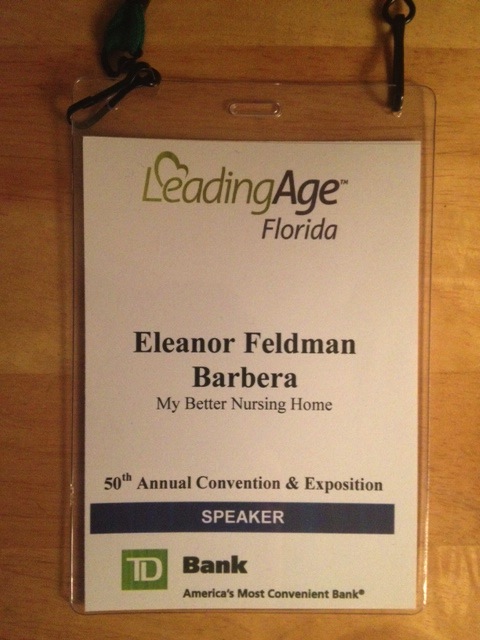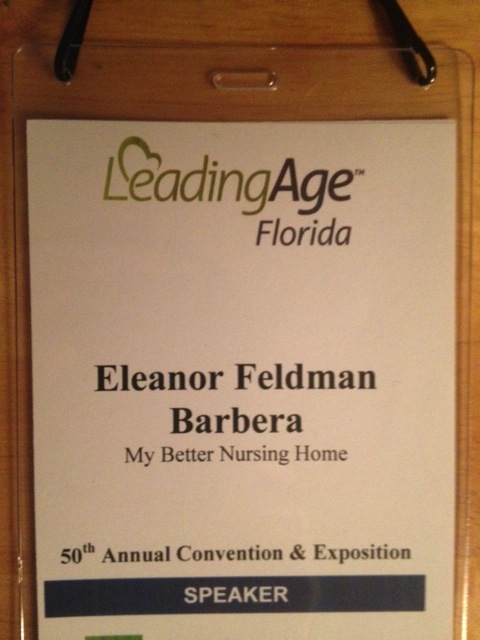Category: Customer service
Posted by Dr. El - September 6, 2013 - Business Strategies, Customer service, McKnight's Long-Term Care News, Resident care

Here’s my latest article on McKnight’s Long-Term Care News:

Last week, McKnight’s staff writer Tim Mullaney wrote about the new Medicare guidance that guarantees that same-sex married couples can live in the same nursing home. Perhaps, like many of our current opposite-sex married couples, they’ll share the same room or apartment. Is your staff prepared to offer them the same respectful service they’re providing for your male/female couples? Are you prepared to lead the way, regardless of your personal beliefs regarding homosexuality? I’ll bet you’re not.
Why do I say this? Maybe your religion denounces homosexuality, yet you strive to be open (and have your facility open) to people from all walks of life. You might take a “live and let live” approach. But even if you are openly gay yourself and comfortable with your sexuality, chances are excellent that there are people on your staff who feel very uncomfortable with homosexuality and will need additional training in order to be able to successfully assist gay couples.
I say this because I worked with a well-meaning aide who, despite knowing nothing about my background really, repeatedly thought she had to try to “save” me through conversion to her (anti-gay) religion. As a psychologist, I could read and deflect her good intentions, but I doubt a gay couple under her care would feel the same way.
For the entire article, visit:

Posted by Dr. El - July 26, 2013 - Boomers, Business Strategies, Customer service, McKnight's Long-Term Care News

Here’s my latest article at McKnight’s Long-Term Care News:

“You do so much for seniors,” my friends tell me, having heard too many stories about the horrors of nursing homes. “Those places need more people like you.”
“Actually,” I respond, “there are lots of people like me out there trying to do the right thing for our elders.”
Nowhere was this more apparent than at the 50th annual LeadingAge Florida convention this month, where I was speaking about the psychosocial needs of baby boomers. I was surrounded by people who, like me, were all jazzed up about long-term care and excited about the possibilities for improving services.
My talk about the needs of baby boomers generated an exciting exchange of ideas, with members of the audience sharing innovative best practices with each other. Among the best practices mentioned:
- To address boomers’ need and expectation of being socially connected while in a long-term care setting, many of the Florida facilities have WiFi and use the Internet to help families stay connected. Skype and other video chat services are available for care plan meetings as well.
- Individual preferences for music were met at one site through an iPod program that offered an iPod for each interested resident, complete with “their” music chosen from the thousands of songs in the home’s music library.
- Lending credence to my assertion that a strong resident council is the driving force of a good home, one CCRC reported that the dynamic and thriving resident council of their independent living facility generates innovative suggestions that the administration follows to make successful improvements. For tips on how to rejuvenate a lackluster resident council, start here for the first in a 3-part blog series designed to create effective meetings that energize your community.
For the entire article, visit:
For more on boomer needs, read
Posted by Dr. El - July 17, 2013 - Boomers, Business Strategies, Customer service, Talks/Radio shows, Younger residents


I’m honored to be speaking at LeadingAge Florida’s 50th annual convention this year. I’ll be talking tomorrow morning about the anticipated psychosocial needs of baby boomers. If you’re at the convention, please come by to hear me and be sure to say hello afterward. Hope to see you there!
Posted by Dr. El - July 11, 2013 - Business Strategies, Common Nursing Home Problems and How Psychologists Can Solve Them, Customer service, McKnight's Long-Term Care News, Role of psychologists

Here’s my latest article at McKnight’s Long-Term Care News:

John O’Connor’s recent
post on the pain/depression cycle raised some interesting points about depression in long-term care. He referenced a 2009 study that found that over 47% of nursing home residents suffer from some level of depression, and he reported on a University of Pittsburgh Medical Center study showing the effectiveness of talk therapy with elders.
Despite this, O’Connor points out, psychological services in LTC are often underutilized. As I noted in my 2010 article, Improving the treatment of mental health issues in nursing homes, we can do more to identify residents who may benefit from psychological services and systematically refer them for treatment before problems become entrenched.
Learned helplessness
The University of Pittsburgh study reported that one of the helpful aspects of psychotherapy is the reduction of the learned helplessness often seen in depression. Learned helplessness comes about when a person believes that they have no control in a situation, even when they do….
Learned helplessness in LTC residents
There are many situations in long-term care that can lead to learned helplessness among our residents. Every time a call bell goes unanswered for too long, it leads residents to conclude that there’s no point in asking for help. When a staff member tells a resident she’ll follow through on a task and then doesn’t, that experience is reinforced.
For the entire article, visit:
My book, The Savvy Resident’s Guide, is a great tool for reducing learned helplessness. Please consider giving it to your residents or loved ones.

Posted by Dr. El - June 14, 2013 - Boomers, Business Strategies, Communication, Customer service, Engaging with families, McKnight's Long-Term Care News

Here’s my latest article at McKnight’s Long-Term Care News:

5 lessons long-term care providers can learn from Joan Lunden
Award-winning journalist and author Joan Lunden and I met recently to talk about eldercare issues. Joan’s mother is 94 years old and happy in a small care home after living for years in the community with home care.
Joan, a physician’s daughter, talks with family caregivers around the country as part of her mission to educate people about the challenges of eldercare.
The observations she shared in our conversation deserve attention from LTC providers looking to meet the needs of residents and their families. As a spokeswoman for family caregivers, her experience echoes that of millions of families across the country.
1. Help people choose the right level of care for their loved one.
The small care home was the third placement for Joan’s mother once she could no longer live in the community.
Lunden: When I finally moved my mother into a facility, I moved her into a place that would have been great for my mother 10 years ago. I moved the mother that was in my head. In reality, the beautiful dining room scared her because she didn’t recognize people, she was alone in her apartment when she started sundowning. The place terrified her. I had chosen the completely wrong facility.
As LTC providers, who recognize the toll it takes on elders and their family members to move from facility to facility, we can do more to help families find a placement that meets the needs of their loved one.
- We can strive to provide the family with a realistic assessment of needs and what a facility can offer.
- We can refer residents to other levels of care within our systems.
- We can build relationships with other facilities so that we refer potential residents to each other.
2. Assist families with the transition to parenting their parent
Joan points out that shifting the roles in the family can be very challenging.
Lunden: When you get to that life transition when you become the parent to your parent, it doesn’t feel natural because you’ve spent a lifetime learning to be a child to them and they have always been in that parental position. To all of a sudden have that role reversed is very disconcerting to a lot of people. It’s a hard one to accept. It often feels uncomfortable to tell your parent what they can do or can’t do.
Some families come to us having negotiated the shift in roles for years, but more often we find adult children and their loved ones struggling to find a way to handle dramatic role changes in the midst of a health crisis.
We can assist families with the role transition when we:
- Offer family education groups.
- Refer to counseling resources in the community.
- Recommend written resources such as David Solie’s book, “How to Say It to Seniors” which focuses on the communication challenges between adult children and their aging parents.
- Use our consulting psychologists to help the team with challenging family issues.

3. Provide an opportunity for staff to take a break
Joan offers a place for caregivers to recharge through her Camp Reveille.
Posted by Dr. El - May 17, 2013 - Business Strategies, Common Nursing Home Problems and How Psychologists Can Solve Them, Customer service, McKnight's Long-Term Care News, Motivating staff, Something Good About Nursing Homes

Here’s my latest article at McKnight’s Long-Term Care News:

In long-term care we spend a lot of time focused on the physical health of those in our care. With increased emphasis on culture change and the update to the MDS (and hopefully as a result of this column), we’ve begun to address the mental health of our residents more adequately.
We do this not only by assessing the needs of individuals, but also by creating a healing emotional environment for all residents. It’s easier for our staff members to create an emotionally healing environment for residents when the work environment is psychologically healthy for them.
What makes a psychologically healthy workplace?
The American Psychological Association (APA) Center for Organizational Excellence recognizes five different elements that contribute to a healthy environment:
- Employee involvement includes efforts to involve employees in decision-making and give them more opportunity for autonomy.
- Work-life balance is a recognition that responsibilities outside work can impact on performance on the job, leading to programs that assist workers in managing childcare, eldercare, financial crises, etc.
- Employee growth and development focuses on offerings that provide employees with the opportunity for new skills and experiences such as coaching or mentoring, continuing education, tuition reimbursement, etc.
- Health and safety comprises programs that work to maximize employees’ physical and emotional health such as stress management programs, adequate insurance, healthy lifestyle motivators, safe practices training on the job, and Employee Assistance Programs (EAPs).
- Employee recognition includes ceremonies that acknowledge individual and group contributions to the organization, performance-based bonuses and pay increases, and acknowledgement of milestones.
The benefits of a psychologically healthy workplace
According to the APA Center for Organizational Excellence, which has been honoring exemplary company practices since 1999, having a healthy workplace isn’t just good for employees. A psychologically healthy environment can reduce staff turnover and absenteeism, improve performance, and enhance the quality of services provided.

Posted by Dr. El - April 8, 2013 - Business Strategies, Communication, Customer service, Depression/Mental illness/Substance Abuse, Engaging with families, McKnight's Long-Term Care News, Resident care


Here’s my latest column at McKnight’s Long-Term Care News:
I have great respect for those who attend to the often complicated physical needs of our long-term care residents, but if your facility doesn’t have a solid social service department, it isn’t as good as it could be. Yes, the medical care is vital, but the social service department addresses many of the issues essential to resident satisfaction.
Market researcher Margaret A. Wylde, PhD, notes that the three most important elements of satisfaction with a long-term care community are the friendliness of staff, the degree to which residents feel the community is their home, and the opportunity they have to stay connected with the rest of the world.
In her 2010 McKnight’s Online Expo talk, she stated that it’s very satisfied residents who refer others to their communities.
Consider the multitude of tasks the average social worker performs:
· Helps the resident settle into the facility
· Handles roommates conflicts
· Facilitates room changes
· Assists with the purchase of new clothing
· Locates or arranges for reimbursement of lost clothing
· Facilitates the signing of financial forms
· Explains and establishes advance directives

Posted by Dr. El - March 28, 2013 - Business Strategies, Customer service, Long-Term Living Magazine, Resident care

Here’s my latest article in Long-Term Living Magazine online:

When the psychologist arrived at Mrs. Winters’ room, she found her distraught and disheveled. “Last time you saw me I was stuck by that dresser in the corner and couldn’t get out. This time it’s something else!” She shook her fist at the ceiling and looked heavenward. “You know what that aide said to me?” She continued without waiting for a response. “When I told her I wanted to take my shower at night instead of this morning, she said I couldn’t! It was this morning or nothing. Of course I refused. What kind of nonsense is that? I’ve been taking nighttime showers my whole life!”This article, which follows last month’s post on physical design features in the long-term care setting, addresses two additional areas of care that can be modified to offer more control and autonomy to those we serve—scheduling and training. Increasing control is important because residents often enter long-term care due to sudden and unexpected health problems that have thrown them intocrisis. When residents perceive control over what is generally a highly structured new environment, it helps them cope with stressors, reduces their depression and anxiety and increases their satisfaction with care.
SCHEDULING FEATURES
Offering increased flexibility within daily schedules can provide opportunities for residents to have more choice in how their days unfold. They engage in the same activities such as rehab and dining, but they can arrange their days to meet their own preferences rather than subsume their desires to the nursing home schedule.
Many adjustments in scheduling can be made without dramatic shifts in the staff routine, such as offering residents their choice of shower time. Rather than incorporating a multitude of changes simultaneously, new areas of flexibility can open up sequentially, giving the staff (and residents) time to adapt and to consider other parts of the schedule that can become more adjustable.
TRAINING FEATURES
Offering more choices for residents will be as successful as the reception from the staff. If resident requests receive sighs, frowns and obvious irritation, residents will quickly learn that the options are for marketing purposes only and that they won’t be implemented without repercussions. In that case, because their wellbeing depends on the good will of the staff, only the feistiest residents will take advantage of newly created choices.
For more, visit LTL magazine online:
Posted by Dr. El - March 26, 2013 - Business Strategies, Customer service, Dementia, McKnight's Long-Term Care News, Resident care


Here’s my latest column at McKnight’s Long-Term Care News:
Secrets to making your environment ’emotionally healing’
Back when I worked in psych, one of our most effective tools to improve mental health was maintaining a healing emotional environment, or therapeutic milieu. That’s why I was shocked when I first entered long-term care.
I couldn’t believe the din that faced me on the floors or the way some people spoke to the residents or the lack of coordination of care. In some ways, the settings are so similar —inpatient care, short- and long-term stays, family involvement, treatment teams, etc. — but the focus on physical versus mental health creates completely different atmospheres.
The reality is that even though our residents are entering LTC due to physical problems, their medical troubles impact their mental health and vice versa.

Posted by Dr. El - February 26, 2013 - Business Strategies, Customer service, Long-Term Living Magazine

Here’s my latest article in Long-Term Living Magazine online:

What design features do LTC residents most want?
The psychologist walked into Mrs. Winters’ room and found her in the corner, muttering under her breath. “Is everything okay?” the psychologist asked, concerned. Mrs. Winters was usually a calm lady, but today her face was tight with anger.“Thank goodness you’re here!” Mrs. Winters cried. “I came over here to get a letter from my nightstand and now I can’t get out of this spot!” She tried to move her chair backward but the wheels jammed into the wall. She pushed the chair forward and ran into the bed. “I’ve been stuck like this for almost an hour and my call bell is on the other side of the bed. It’s a good thing I’m too angry to cry because I can’t reach my tissues either!”Renovations and redesigns large and small can breathe new life into a facility, especially when they’re focused on the needs of the people who live and work within them. The changes that are most important to the residents tend to be those that center on their psychological need to regain control. Most residents enter long-term care after a fall or other health crisis takes them from their home and thrusts them into an unfamiliar environment with rules not of their own making. Meals are served on schedule, toileting depends on staff availability, and discharge plans rely on a host of factors and players that can’t be managed by the resident. When the big things in life are spiraling out of control, being able to direct the small things can make a world of difference. Here are some design changes that matter most to the residents.
WITHIN RESIDENT ROOMS
To provide increased control within each room, consider that most nursing home residents have limited mobility and are often in wheelchairs that are difficult to maneuver in small spaces. Residents spend significant amounts of time in bed, unable to get out on their own. While most LTC facilities have mechanical beds that allow residents to adjust themselves as needed, there are many additional aspects of the environment that could be under resident control.
- Room temperature. Many times the call bell is ringing because a resident wants a window opened or closed or wants the air conditioning adjusted. Providing remote controls for the air conditioning and heating system allows the residents to take care of this function and frees staff time for other concerns. If the windows can be opened by remote (or easily opened manually) this improves quality of life, especially because getting outside for fresh air can be such a challenge.
- Large remote control for TV. Residents may have remote controls for their televisions, but have difficulty using them due to overly complicated designs with small buttons and tiny labels. The best remote controls are simple, with large well-labeled buttons, yet are not so heavy that frail elders have trouble holding them. Provide recommendations to family members as part of a good customer service program.
- User-friendly telephone. Similarly, the best telephones are the least complicated. They have large buttons, a loud ringer and speaker, are impervious to liquids and can withstand the inevitable falls that occur during use in long-term care. If families are providing phones, offer them these suggestions because you’re the experts and they’re probably going through this for the first time.


















